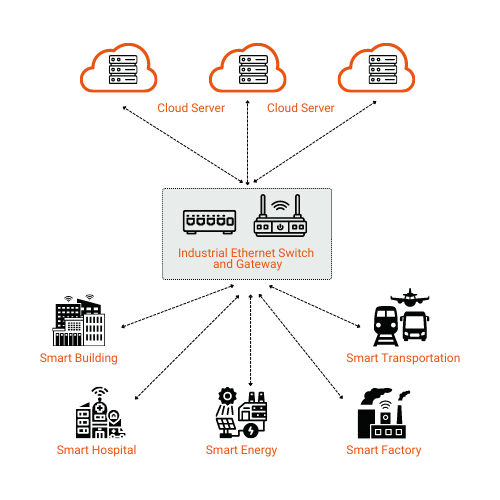By Phillip Dodd,
Technology Lead IIoT Engineering Infrastructure & Security, Fiberroad Technology
IIoT and Smart cities help cities operate more efficiently, reduce environmental impact, and provide cost-effective public services. In the future, these technologies may even help to improve public safety. For example, a citizen could use their mobile device to report potholes, which would prompt a city to fix them. Similarly, smart buildings could automatically adjust their lighting and temperature to improve energy efficiency and lower the building's carbon footprint. Furthermore, these connected devices will be able to inform, reroute, and adjust situations before they become problematic.
Reduces Environmental Impact
Smart cities are the wave of the future, and the Internet of Things is at the heart of these developments. However, the increased use of these devices is causing an increasing amount of environmental damage. Not only are these devices generating a lot of waste, but they also contain dangerous toxins. As a result, depleted batteries are ending up in landfills around the world.
As cities become smarter, they can manage water and air quality more efficiently. In addition, smart cities can create an alert system when pollutants become too high, which can prompt a specific public action, such as a road closure. Moreover, these systems can also notify citizens via mobile apps, emails, or websites, prompting them to adjust their behavior.
Smart cities are also concerned with climate change and how to address it. In fact, the United Nations recently ratified the Sustainable Development Goals (SDGs) as a way to tackle climate change. Smart cities can help reduce energy consumption and reduce climate impact by integrating the Internet of Things into their infrastructure.
Improves Standards Of Living
Smart cities, built using IIoT and analytics, can improve the standard of living by delivering efficient and cost-effective public services. This concept can help cities tackle some of the biggest urban challenges, such as climate change, energy shortages, and resource depletion. As the population grows, pressure is also put on natural resources, causing cities to look for innovative ways to reduce waste and increase efficiency.
IoT technologies could also improve the quality of transportation systems. The Internet of Things can be used to monitor road conditions, which could lead to a better driving experience. It can even help prevent the onset of diseases by monitoring their symptoms. As a result, smart cities can improve standards of living by reducing pollution and enhancing air quality.
IoT technologies can also improve energy management in buildings and power networks. Several applications of IoT are already underway, including smart energy management. The potential is enormous.
Delivers Cost-Effective Public Services
Delivering cost-effective public services is a difficult challenge for the Indian government, especially when the government is tackling issues of poverty and marginalization. This requires a careful evaluation of different options. The key factors to consider are the quality of the services, expected performance, revenues, and transition activities. To meet the challenges, governments can engage an external service provider, outsource certain services, or bring them in-house.
Public sector organizations need to provide a range of services, including electricity, health care, and more. The provision of electricity is a prime example. Electricity prices are particularly high in some countries. Electricity prices are among the biggest problems facing many governments in many countries. But a new report by the Institute of Fiscal Studies says that most of the public thinks that governments should work with the private sector to provide these services.
By increasing competition, governments can cut costs while maintaining quality. The report uses international evidence and expertise to show how competition improves public services. It also explores a number of cases, such as prison management and hospital facilities management.
Increases Economic Growth
Smart cities can promote renewable energy by allowing rooftop solar owners to sell to each other, operating microgrids, and monitoring environmental factors in specific areas. These technologies can also help reduce air pollution, a serious problem in urban areas. Today, 92% of the world's population lives with pollution levels that exceed recommended limits, causing an estimated 3M deaths annually.
Several countries are investing in the technology necessary to transform their infrastructure into smart cities. Many countries have also committed to investing billions of dollars in smart city technologies. These initiatives are expected to fuel the growth of the IIoT market in smart cities. Some cities are even planning to implement smart lighting systems on their public roads. Other cities, such as have made significant investments in IoT technology, including solar panels on the rooftops of 6,000 buildings.
The use of the Internet of Things in cities can help solve environmental concerns while increasing economic growth and improving the lives of citizens. IoT solutions are already helping organizations cut costs by up to 4% or 5%. Governments may also try to encourage the adoption of IoT by enterprises in order to boost the competitiveness of these industries and generate additional tax revenue.




















 sunrise
StableDiffusion
sunrise
StableDiffusion
 bonfire friends
StableDiffusion
bonfire friends
StableDiffusion
 sadness
StableDiffusion
sadness
StableDiffusion

 purple skies
StableDiffusion
purple skies
StableDiffusion

 true love
StableDiffusion
true love
StableDiffusion
 My Cheerleader
StableDiffusion
My Cheerleader
StableDiffusion
 womans transformation to happiness and love
StableDiffusion
womans transformation to happiness and love
StableDiffusion
 future life together of adventures
StableDiffusion
future life together of adventures
StableDiffusion

















